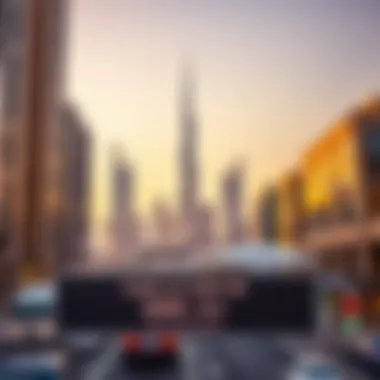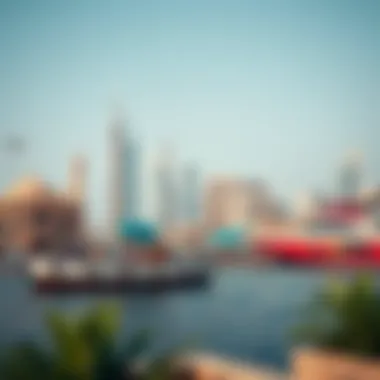Jebel Ali: Dubai's Hub for Trade and Industry


Intro
Nestled along the coastline of Dubai, Jebel Ali has carved out its unique identity as a driving force in the region's trade and industrial landscape. With the largest port in the Middle East, it serves as more than just a connection point for shipping goods; it is a bustling hub for businesses and expatriates alike. Exploring Jebel Ali offers not only an insight into its economic vitality but also into the rich blend of culture and lifestyle that characterizes this area. Whether you are a traveler, a local resident, or an entrepreneur, Jebel Ali presents opportunities that are difficult to overlook.
Area Overview
Neighborhood Characteristics
Jebel Ali is a vibrant locale marked by its modern infrastructure and diverse population. The area blends a mix of industrial zones with residential communities, making it an attractive spot for various demographics. The Jebel Ali Free Zone (JAFZ) attracts numerous global companies, contributing to the area’s lively atmosphere. Moreover, the establishment of contemporary amenities such as malls, parks, and schools has made the neighbourhood appealing to families and singles alike.
One notable aspect of the area is its strategic location. With proximity to Dubai’s key commercial areas and a well-connected transport network, commuting is a breeze. Infrastructure includes well-maintained roads and public transport options, enhancing access to surrounding areas. Living here allows residents to enjoy a balanced life—a blend of work and leisure.
Cost of Living Analysis
The cost of living in Jebel Ali tends to be on par with other areas in Dubai, though it can vary based on lifestyle choices. For expatriates, housing options range from luxurious villas to more modest apartments, accommodating various budgets. Generally, one could expect to pay anywhere between AED 50,000 to AED 150,000 annually for rental properties, depending on size and location.
Utility bills, including electricity and water, might amount to AED 400 to AED 600 monthly for an average-sized apartment. Additionally, grocery prices can fluctuate, but many find shopping at local markets an affordable way to enjoy a variety of goods. Overall, Jebel Ali offers diverse options that cater to different financial situations, making it accessible yet vibrant.
Lifestyle Insights
Cultural and Recreational Activities
The cultural tapestry of Jebel Ali is rich and varied. While the area is known for its economic prowess, it also hosts cultural events that draw communities together. The annual Dubai Shopping Festival often extends its reach to Jebel Ali, offering residents a chance to engage in shopping sprees and festivities. Local parks and community events frequently host family-friendly activities which often feature traditional music and dance.
One popular venue is the Jebel Ali Recreation Club, providing numerous sports facilities and social gatherings that foster community spirit. The outdoor spaces here encourage healthy living and social interaction, making it a key aspect of life in Jebel Ali.
Local Dining Experiences
When it comes to dining, Jebel Ali doesn’t disappoint. The array of restaurants and eateries reflect the multicultural environment of the area. From fine dining establishments like The Chefs Club offering international cuisines to local takeaways serving delicious Middle Eastern fare, there's something for everyone.
Food trucks pop up throughout the neighborhood, showcasing a range of gastronomies, from spicy Indian curries to sweet Turkish delights. Residents take pride in not just filling their stomachs but embracing culinary experiences that tell a story of Jebel Ali's diverse landscape. Seeking out local hotspots allows one to genuinely savor the essence of the area.
"Jebel Ali is not just about trade—it's about building experiences and relationships in an ever-evolving landscape."
For those looking to discover more about the lifestyle and culture in Jebel Ali, resources like Wikipedia and Britannica offer further insights, while forums like Reddit provide a platform for discussions and community advice. Dive into the vibrant essence of Jebel Ali, where opportunity and culture collide.
Prologue to Jebel Ali
Jebel Ali serves as an essential part of Dubai’s vast economic framework. As the largest man-made harbor globally, it holds a unique geographical and strategic position that greatly influences not just the UAE, but the entire Middle East. This area is more than just a port; it’s a vital springboard for trade and industry, making it a significant focus for expatriates, tourists, and local business entities. Understanding the importance of Jebel Ali means appreciating its multifaceted contributions to global commerce and the opportunities it creates for living and working in an economically dynamic environment.
Geographical Significance
Situated approximately 35 kilometers southwest of the city of Dubai, Jebel Ali occupies a pivotal location along one of the world’s busiest maritime routes. It isn’t just a dot on the map; it connects East and West, allowing ships from various nations to dock and engage in trade. This proximity to the Arabian Gulf enhances its strategic role, welcoming thousands of container ships each year. Beyond logistics, the area impressively hosts the largest free trade zone in the region. The sheer size of the port rivals many of its counterparts globally, making it a linchpin in the supply chain for goods ranging from electronics to textiles.
Furthermore, Jebel Ali is linked through an intricate web of road and rail connections, ensuring smooth transit of cargo and personnel. The integration of transportation systems, like the Sheikh Zayed Road, aids in channeling traffic effectively, encouraging regional development. The richness of the landscape also plays a role, where expansive stretches of desert gradually meet the coast, providing a backdrop that makes this bustling hub even more intriguing.
Historical Overview
To grasp the full significance of Jebel Ali, one must trace its origins. The area was relatively barren before the late 1960s, primarily used for fishing and small-scale trade. The genesis of Jebel Ali Port can be attributed to a vision from Sheikh Rashid bin Saeed Al Maktoum, who recognized the need for a modern port to support Dubai’s economic ambitions. The port was completed in 1977, and its opening marked the beginning of a transformative era for Dubai’s economy.
Over the years, Jebel Ali has undergone a remarkable metamorphosis. What started as a modest development quickly grew into an international trade juggernaut, attracting foreign investments and multinational corporations. Notably, the establishment of the Jebel Ali Free Zone in 1985 further propelled its status, luring businesses with zero taxes and full ownership rights. This history shapes the socio-economic landscape today, where Jebel Ali is synonymous with progress and opportunity.
In summary, understanding Jebel Ali through its geographical importance and historical evolution is vital for anyone looking to engage with this dynamic area. It is a microcosm of Dubai's ambitions and a testament to the potential of industry and commerce in the region.
Economic Landscape
The economic landscape of Jebel Ali plays a pivotal role in shaping not just Dubai's commercial outlook, but also its standing on the global stage. This area, often referred to as the backbone of the emirate’s trade dynamics, is where the threads of various industries intertwine to create a vibrant economic fabric. The importance of this topic can't be overstated; it's the lifeblood for expatriates seeking job opportunities, for tourists exploring business and leisure, and for locals engaged in various aspects of the trade.
Role of Jebel Ali Port
Jebel Ali Port is a major artery for trade in the Middle East, often hailed as one of the busiest hubs globally. With its strategic location, the port serves as a gateway for goods flowing between East and West. The facilities at the port are impressive, featuring extensive docking capacity and advanced cargo handling technology. This keen focus on efficiency not only speeds up the delivery of goods but also significantly reduces costs, making Jebel Ali a favored choice for international businesses. Every ship that docks here signifies more than just trade; it embodies economic growth and the intricate network that connects various nations.
Industrial Development Zones
The industrial development zones surrounding Jebel Ali have become breeding grounds for innovation and manufacturing. These areas are strategically designed to accommodate various industries, from electronics to textiles. By offering incentives such as tax exemptions and custom duty benefits, Dubai encourages both local and foreign businesses to set up their operations here. The zones are bustling with activity, providing a fertile environment for startups as well as established firms. What sets them apart is the integration of state-of-the-art facilities along with the logistical advantages that the port offers. The result is a seamless process from production to export.
Employment Opportunities


Types of Industries
When we talk about the types of industries in Jebel Ali, the diversity is quite striking. You'll find sectors such as logistics, manufacturing, hospitality, and finance, each contributing significantly to the local economy. The unique advantage of this wide-ranging industrial makeup is that it creates an array of job opportunities for individuals with varied skill sets. For instance, logistics companies thrive here due to the proximity to the port, while technology firms benefit from the advanced infrastructure. The interlinking of these industries enhances overall productivity, making Jebel Ali a buzzing nexus of economic activities.
Job Market Trends
In recent years, job market trends in Jebel Ali have shown a marked shift towards skill specialization. As businesses evolve, so too does the demand for skilled labor. This evolving market favors candidates with technical skills and experience in logistics and supply chain management. Another aspect to consider is that the job market here tends to be quite dynamic, often reflecting global economic conditions. A potential downside is the competitive nature of the job market; however, those equipped with the right capabilities are often highly sought after. As new industries continue to emerge, particularly in technology and renewable energy, opportunities abound for both seasoned professionals and newcomers alike.
"Jebel Ali is a gateway not only geographically, but economically. The port and its surrounding industries keep both Dubai's wheels turning and its development thriving."
Real Estate in Jebel Ali
The real estate market in Jebel Ali offers a stimulating mix of options for those looking to buy or rent property in Dubai. Given its strategic importance in trade and industry, understanding this sector is essential for expatriates, investors, and locals alike. The various offerings in real estate—from residential to commercial—showcase the area's adaptability and appeal.
Residential Options
Apartments
Apartments in Jebel Ali are well known for their modern amenities and convenient layouts. These properties typically attract expatriates who appreciate a lifestyle that balances work and leisure. One key characteristic of these apartments is their accessibility to major transport links, such as the Metro and major highways, making commuting to the rest of Dubai relatively easy.
Amenities often include swimming pools, gyms, and shared spaces that foster community interaction. An undeniable advantage is the affordability compared to other areas in Dubai. However, it is crucial to note that the market can be competitive, leading to fluctuating prices depending on demand and location.
Villas
Moving on to villas, Jebel Ali has some magnificent offerings that are spacious and family-friendly. These are popular among those who seek a slice of tranquility, often featuring gardens and private pools. The key appeal of villas in this locality lies in their architectural diversity and community-focused living.
A unique feature is the availability of secure, gated communities that prioritize privacy and safety, making them an ideal choice for families. While villas present an inviting lifestyle, the downside can be the higher price tags attached to luxury features and expansive layouts, which may not fit every budget.
Townhouses
Lastly, townhouses present a compelling option for individuals or families who desire a blend of apartment and villa-style living. Generally, these properties offer a compact yet modern design, and they tend to be positioned in family-oriented neighborhoods, which enhances their appeal.
The key characteristic of townhouses is the balance between space and affordability; they usually provide more room than a standard apartment without reaching the price bracket of a villa. One disadvantage might be the shared walls with neighbors, which can limit privacy, but many residents find the trade-off for communal living worthwhile.
Commercial Properties
Office Spaces
The demand for office spaces in Jebel Ali is on the rise, thanks in large part to its burgeoning economy and business-friendly environment. These properties, often situated in state-of-the-art buildings, attract a range of companies from start-ups to established firms. A principal characteristic of the office spaces is their access to essential business services, which creates synergy among businesses.
Additionally, many office spaces are designed with flexibility in mind, allowing companies to scale according to their needs. However, the challenge here can be the cost of high-end office spaces, which may be prohibitive for smaller businesses.
Warehouse Facilities
Warehouse facilities are another crucial segment within Jebel Ali's commercial real estate. Positioned strategically near the port and major transport hubs, these facilities are indispensable for businesses in logistics and trade. Notably, these warehouses are equipped with modern technology and infrastructure that support efficient operations, including ample loading docks and storage solutions.
One distinctive benefit of investing in warehouse facilities in Jebel Ali is the proximity to international shipping lanes, which saves time and reduces costs for import and export activities. On the downside, warehousing can require a significant capital investment, and the specialized nature of the properties can limit adaptability.
Investment Potential
Jebel Ali’s real estate market showcases significant investment potential, making it a focal point for those looking to capitalize on Dubai's economic growth. With the expected rise in population and continued expansion of industry and trade, real estate here is projected to appreciate in value.
The growing demand for both residential and commercial spaces adds to the attractiveness of investing in Jebel Ali. However, every investment comes with its challenges, such as market fluctuations and regulatory requirements. Yet, with diligent research and strategic insight, stakeholders can navigate these waters effectively.
This comprehensive examination of real estate in Jebel Ali outlines the region's vibrant landscape, showing that whether one is seeking a comfortable home or a lucrative business property, Jebel Ali holds promise for all.
Lifestyle in Jebel Ali
Jebel Ali is not just a hub of trade and industry; it's a vibrant community that offers a unique lifestyle to its residents. The blend of cosmopolitan living and local culture makes it an attractive place for expatriates and locals alike. The accessibility to various recreational activities, dining options, and shopping venues makes Jebel Ali much more than just a port city; it is a complete package for those who call it home.
Dining and Entertainment
Restaurants
The restaurant scene in Jebel Ali is a melting pot of flavors and culinary delights. From casual eateries serving local dishes to high-end establishments offering international cuisine, there’s something to satisfy every palate. One key characteristic is its focus on quality and variety. The local dining scene often features chefs who have experience from prominent kitchens around the world.
- Unique Feature: Many restaurants in Jebel Ali showcase traditional Emirati food alongside western favorites.
- Advantages: This variety attracts diverse clientele, encouraging cultural exchange and making every meal an experience.


However, patrons often find that some places can be pricey, especially those that offer a lavish dining experience. Overall, it is the culinary craftsmanship that stands out most, allowing diners to explore new flavors while enjoying the familiarity of home-cooked meals.
Nights Out
When the sun sets, Jebel Ali comes alive with vibrant nightlife options that cater to a broad spectrum of tastes. The nightlife scene is characterized by rooftop bars, lounges, and nightclubs, each providing a unique ambiance, from relaxed evenings to energetic dance nights. This diversity makes it a popular choice for both expats and tourists looking for an engaging night out.
- Unique Feature: Some venues offer live music and themed nights, creating an electrifying atmosphere.
- Advantages: Such options not only provide entertainment but also foster community engagement amongst the diverse population.
However, not all venues might appeal to those looking for a quieter night. Consequently, it is important to choose the right place according to one's preference for ambiance and activity level.
Shopping Venues
Malls
Shopping in Jebel Ali is a pleasurable experience, with several large malls offering everything from high-end brands to local boutiques. These malls are more than just retail spaces; they serve as community hubs where families and friends gather. The expansive layouts include cinemas, play areas for children, and various dining options, thereby creating a one-stop-shop experience.
- Key Characteristic: The combination of shopping, entertainment, and dining makes malls in Jebel Ali extremely popular.
- Advantages: They cater to all ages, ensuring that everyone finds something entertaining to do.
Nonetheless, shoppers can find that the many choices can be overwhelming. Therefore, having a plan can help mitigate the vast options available.
Local Markets
Local markets in Jebel Ali present a contrasting experience to the polished malls, showcasing traditional products and artisanal goods. These markets are often small and less commercial but rich in charm. Here, visitors can haggle for spices, handmade crafts, and fresh produce, giving them a taste of local culture.
- Key Characteristic: The vibrant atmosphere with colors, scents, and sounds creates a sensory experience unlike any mall.
- Advantages: Shopping locally supports small businesses and offers unique items that can't be found in larger retail stores.
However, the bargaining process may intimidate some shoppers who are not accustomed to markets. In that instance, patience and open-mindedness are essential for an enjoyable visit.
Recreational Activities
Beaches and Parks
For those who appreciate the outdoors, Jebel Ali is home to stunning beaches and green parks. The beaches offer expansive spaces for sunbathing, swimming, and various water sports, becoming a popular retreat for city dwellers looking for relaxation. The parks, on the other hand, provide picnic spots and jogging trails, where families can spend quality time.
- Key Characteristic: Clean and well-maintained, these spaces allow people to escape the hustle and bustle of city life.
- Advantages: They promote a healthy lifestyle and encourage community bonding activities.
However, these natural spaces can get crowded during weekends and holidays. Planning trips during off-peak hours can make a significant difference in enjoyment.
Sports Facilities
Jebel Ali boasts a range of sports facilities, from football pitches to tennis courts. These venues cater to various levels, whether someone is looking to casually play or compete. The availability of these facilities promotes an active lifestyle and helps foster a sense of community among sports enthusiasts.
- Key Characteristic: Many facilities are equipped with modern amenities, ensuring a high-quality experience.
- Advantages: They create opportunities for fitness and building friendships through team sports.
On the flip side, some facilities may require membership fees or bookings in advance, which can be a downside for spontaneous sports lovers. Still, for those committed to an active lifestyle, these amenities greatly enhance the living experience in Jebel Ali.
In summary, the lifestyle in Jebel Ali beautifully integrates local culture with modern convenience, providing a well-rounded experience for residents and visitors alike. From dining to recreational activities, there's something valuable for everyone in this dynamic community.
Cultural Insights
Understanding Cultural Insights in Jebel Ali is crucial as it unveils the layers of diversity and tradition that shape the community. This part of Dubai is not just a hotspot for trade; it embodies a rich blend of cultures that contribute significantly to its unique identity. Discussing the influences of varied cultures helps illuminate why Jebel Ali resonates with expatriates, tourists, and locals alike.
Multicultural Community
Expat Influence
The expat community in Jebel Ali is a significant driver of its social dynamics. With individuals from various countries calling it home, this melting pot fosters a unique environment where ideas and traditions intermingle. This variety not only enriches day-to-day life but also drives economic growth. Expat influence brings different ways of living, thinking, and working, shaping Jebel Ali into a lively* and at the same time cohesive society.
One noteworthy aspect of the expat scene is its adaptability. As expatriates engage in local businesses and community activities, they create opportunities for growth and collaboration. This collaborative spirit increases the overall economic vitality of the area. However, it also poses challenges, such as cultural tensions or misunderstandings, which can underline the need for effective community engagement.
Cultural Festivals
Cultural festivals are another hallmark of Jebel Ali’s vibrant atmosphere. These events showcase the rich heritage of its diverse population, allowing communities to come together, celebrate, and share their traditions. Festivals such as Diwali, Eid al-Fitr, and National Day are not just celebrations; they offer opportunities for unity among disparate cultures, fostering understanding and appreciation.
The historical relevance of these festivals highlights Jebel Ali’s role as a hub of cultural exchange. While they promote local traditions, they also create a platform for global cultures to shine. However, organizing large-scale events can present logistical challenges and require careful planning to ensure inclusivity and participation.
Art and Heritage


Local Art Scene
The local art scene in Jebel Ali embodies creativity born out of cultural diversity. It showcases a blend of traditional and modern art forms influenced by the varied backgrounds of the community members. The presence of local galleries and art installations allows both residents and visitors to engage with the creative expressions that capture the essence of the area. This blend not only makes it a culturally vibrant spot but also promotes tourism and community pride.
Supporting local artists provides an invaluable boost to the cultural economy, giving exposure to numerous talents. However, there’s a delicate balance to maintain as commercialization risks overshadowing authentic expressions of art.
Historical Sites
Historical sites in Jebel Ali are vital in understanding the area’s past and its development over time. From traditional markets to archeological findings, these sites reflect the region's heritage and its evolution into a modern trade center. They serve as educational resources and attract history enthusiasts, further enriching the community's cultural fabric.
Areas such as the Jebel Ali Fort showcase the architectural significance of historical homes and constructions that tell stories of past eras. While popular, there is often the need for preservation efforts to combat the effects of rapid modernization.
"Cultural insights in Jebel Ali highlight a dynamic interplay of heritage and modernity, beckoning both locals and visitors to immerse themselves in its rich tapestry."
Jebel Ali stands as a testament to the power of cultural interaction, offering a platform where traditions and modernity can coexist and flourish.
Transportation and Connectivity
The significance of Transportation and Connectivity in Jebel Ali cannot be understated. This locality thrives as a commercial hub, owing much of its prosperity to an extensive network of transport links that facilitate the swift movement of goods and people. With global trade as its lifeblood, the effectiveness and efficiency of its transportation system play a crucial role in the economic framework and connectivity of the region.
Road and Rail Links
Jebel Ali's road infrastructure forms the backbone of its connectivity. The well-maintained highways, such as Sheikh Zayed Road, provide seamless access not just to the rest of Dubai but also to the broader UAE. The roads are wide and designed to handle heavy vehicle traffic, a necessary feature given the volume of freight transport through the Jebel Ali Port.
Moreover, the introduction of the Dubai Metro has also enhanced connectivity. The Expo 2020 line connects Jebel Ali to key locations, making commuting easier for both residents and workers. This rail link has not only reduced travel time but has also helped in alleviating traffic congestion, a common issue in urban settings.
"A robust transportation infrastructure is essential for promoting trade and connecting markets. Jebel Ali excels in making these connections."
In addition to regular passenger services, freight transport via rail is also on the rise, indicating a shift towards more sustainable practices. This reliance on multiple transport options underscores the diversity in Jebel Ali's logistics strategy and ensures that it remains an attractive option for businesses.
Proximity to Airports
When talking about connectivity, proximity to major airports is paramount. Jebel Ali is conveniently located near Dubai International Airport and Al Maktoum International Airport. Al Maktoum, being the newer of the two, is specifically designed for cargo and long-haul flights and is set to become one of the world's largest airports upon completion.
The accessibility of these airports plays a pivotal role in facilitating international business, benefitting both the logistics firms operating in the area and expatriates traveling home or exploring other regions. The short travel times—often under an hour by road—add to the allure for companies looking to base their logistics operations in Jebel Ali.
In summary, the transportation framework of Jebel Ali is interwoven with its identity as a trade and industrial powerhouse. The road systems, complemented by rail links and proximity to major airports, provide a comprehensive and efficient transport system that supports its booming economy, making Jebel Ali a prominent player on the global stage.
Challenges and Future Prospects
Differentiating itself as a critical node in Dubai’s vast trade ecosystem, Jebel Ali faces an array of challenges that might impede its progress while also opening doors for future enhancement. Identifying these challenges and navigating them effectively is paramount for stakeholders involved in real estate, trade, and community development.
Environmental Concerns
In this era of rising environmental awareness, Jebel Ali must tackle significant ecological challenges. The extensive industrial and commercial activities have inevitably led to increased pollution and resource strain. With the blazing desert sun beating down on the region, water scarcity is also a pressing issue. Of particular concern is the impact of port operations on local marine life. As ships come in and out, fuel spills and emissions contribute to the degradation of coastal environments.
To counter these risks, the local government is increasingly pushing for sustainable practices across various sectors. Measures such as enforcing stricter regulations on emissions, promoting green technologies, and the development of eco-friendly industrial zones are vital steps targeted at minimizing the environmental footprint.
For investors and businesses, understanding these environmental concerns is not merely about compliance but can also mean capitalizing on green technology opportunities. Organizations focused on sustainability may find lucrative niches in this shifting landscape, proving to be beneficial both economically and ecologically in the long run.
Urban Development Plans
As Jebel Ali strides towards the future, robust urban development plans are critical for maintaining its status as a regional centerpiece for commerce and industry. Strategically planned developments can transform the area, balancing industrial needs with residential and recreational spaces.
New projects are underway, emphasizing mixed-use real estate that caters not only to businesses but also provides living quarters and amenities for employees and families. As the area evolves, the integration of parks, cultural centers, and recreational facilities becomes essential.
The forward-looking urban design can help Jebel Ali cultivate a balanced lifestyle, attracting both local residents and expatriates, enhancing community connectivity.
Moreover, as the demand for logistics and warehousing increases, urban planners are keenly assessing the infrastructure needs related to transportation and connectivity. Expanding road networks and improving public transport will be vital to sustaining growth and flexibility. By efficiently linking Jebel Ali with other regions of Dubai, the area can enhance its appeal, making it a desirable location for businesses eager to capitalize on growth opportunities.
In summary, managing environmental concerns while continuously improving urban infrastructure is not merely a challenge but a pivotal opportunity for Jebel Ali. By embracing these prospects, it can not only solidify its role in Dubai's trade but also enhance the quality of life for its diverse inhabitants.
The End
As we come to a close on our exploration of Jebel Ali, it becomes increasingly clear just how pivotal this area is in the broader narrative of Dubai’s growth. Renowned for its industrial prowess and exceptional connectivity, Jebel Ali is not just a location; it's a gateway that opens doors to economic opportunities.
Summarizing Jebel Ali's Importance
Jebel Ali serves multifaceted roles that enhance its stature. First off, the Jebel Ali Port stands as the largest in the Middle East, effectively positioning the area as a linchpin in global trade routes. This port isn’t merely about size; it’s about efficiency, handling millions of twenty-foot equivalent units (TEUs) yearly, thereby ensuring that trade flows smoothly between continents.
The surrounding Industrial Development Zones offer fertile ground for businesses. Tech companies, manufacturing firms, and logistics providers flock here, benefitting from tax incentives and state-of-the-art facilities. Millions of jobs are created, making Jebel Ali a hotbed for employment opportunities.
Moreover, Jebel Ali isn’t just about business. The lifestyle options available paint a vibrant picture of modern living. From diverse dining experiences to recreational activities suited for families and individuals, it balances work and leisure effortlessly. A quick stroll through the local markets showcases not only the multicultural community but also the deep-rooted traditions interwoven with a forward-thinking ethos.
In summary, Jebel Ali is more than just a geographic point on a map; it represents a microcosm of progress, opportunities, and rich experiences. As globalization continues to mold cities, Jebel Ali positions itself as a forerunner, adapting to the evolving landscape while maintaining its essential identity. Those arriving in Jebel Ali—whether for work, life, or exploration—are welcomed into a dynamic environment teeming with potential.















